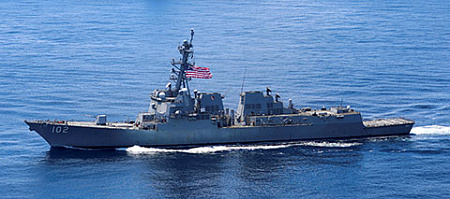
Tensions between the United States and Venezuela have escalated dramatically after Washington deployed three advanced warships to the Caribbean Sea near the Venezuelan coast, citing a crackdown on drug trafficking. In a direct response, Venezuelan President Nicolás Maduro announced the mobilization of over four million militia members to defend the nation’s sovereignty, heightening fears of a potential military confrontation in the region.
The deployment involves the USS Gravely, USS Jason Dunham, and USS Sampson, destroyers equipped with sophisticated technology capable of tracking air, surface, and underwater threats. Officially, the White House has framed the multi-month operation as a robust effort to intercept narcotics from Latin American cartels. The U.S. asserts that these criminal groups utilize advanced methods, including private submarines, to transport their illicit goods through the Caribbean corridor.
This naval maneuver is part of a broader, more aggressive anti-drug strategy under President Donald Trump. In a significant policy shift, his administration designated several Latin American criminal groups, including Venezuela’s Tren de Aragua, as foreign terrorist organizations. This classification, typically reserved for groups with explicit political motives, has been controversially applied to crime syndicates primarily focused on profit, marking a new phase in U.S. regional policy.
The situation is further inflamed by direct U.S. allegations against President Maduro himself. The Trump administration has accused him of leading the so-called ‘Cartel of the Suns’ (Cartel de los Soles), an alleged criminal network operating within the Venezuelan military’s high command. Citing these claims, the U.S. recently doubled the reward for information leading to Maduro’s capture to $50 million. Venezuelan officials have vehemently denied the cartel’s existence, dismissing the accusations as a political fabrication designed to destabilize the country.
This new crisis revives deep-seated animosities from Trump’s first presidency. During that time, Washington refused to recognize Maduro’s election victory, instead backing an opposition leader and imposing crippling economic sanctions on Venezuela. Although that effort ultimately failed to oust Maduro, Trump’s return to the White House appears to have reignited the high-stakes diplomatic standoff, with Venezuelan Foreign Minister Iván Gil Pinto warning that U.S. actions threaten regional peace and stability.
Despite the heated rhetoric and military posturing, most analysts believe a full-scale war remains unlikely. They argue that the conflict is largely driven by domestic politics in both nations. President Trump’s show of force is seen as a way to appeal to hardliners in Washington, while President Maduro is leveraging the specter of an external threat to rally his political base. However, the risk of miscalculation or an unintended incident spiraling into a larger conflict remains dangerously high.
